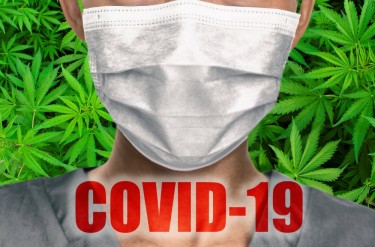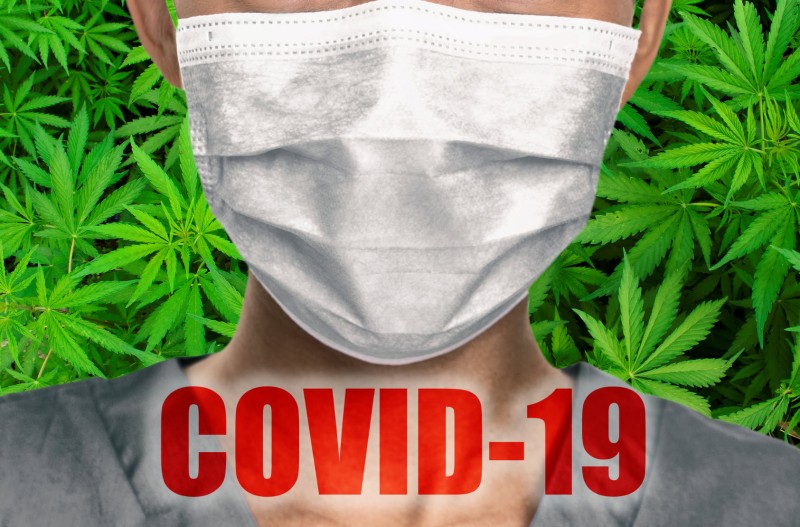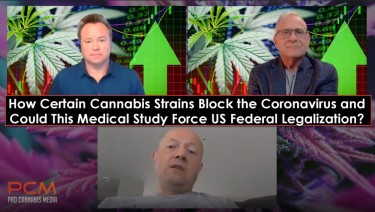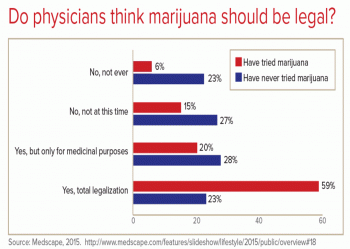
Cannabis helps people ride all types of waves, from work stress to creativity blocks. But its most impressive feat yet may be helping consumers weather the COVID storm far better than non-users.
Exciting new research presented at the American College of Chest Physicians conference found hospitalized COVID patients who used cannabis had significantly lower rates of intubation, respiratory issues, organ failure, cardiac arrest, and death compared to non-consumers.
This data reinforces earlier studies showing better COVID outcomes among cannabis patients. It adds to the scientific case that humanity's oldest plant ally uniquely equips our biology for resilience against all types of challenges, even novel viruses.
The large-scale study analyzed over 300,000 medical records, with approximately 1% of patients identified as regular cannabis consumers. After carefully controlling for demographics and comorbidities, a striking pattern emerged - cannabis patients faced reduced COVID complications and death rates up to three times lower than non-users!
This protective effect very likely arises from the many anti-inflammatory, antiviral, and immune-modulating properties of cannabis compounds. Though the exact biological mechanisms require more research, the epidemiological evidence clearly indicates this plant can give humans a crucial advantage against the worst pandemic in generations.
Cannabis's rich pharmacopeia likely bolsters cellular defenses, preventing viral entry and replication. Its antioxidant and neuroprotective effects could also mitigate severe cytokine immune reactions that drive respiratory distress.
Additionally, cannabis enhances cardiovascular function and balances metabolism - key benefits in countering COVID-induced blood and oxygen issues. The science is still early, but this seminal study proves cannabis engagement holds profound promise against infectious disease.
Beyond physiological factors, cannabis may also protect by promoting psychologically-healthy lifestyles. Studies show consumers average better diet quality, exercise more, and have lower stress and depression. This translates into stronger mental fitness to navigate COVID's emotional toll.
Of course, reckless stoner stereotypes tempt prohibitionists to dismiss this harm-reducing herb. But science confirms cannabis prudently consumed as part of a balanced lifestyle offers holistic protective benefits we're only beginning to understand. Open minds will soon recognize its profound applications.
Does cannabis cure COVID? No single remedy exists for such complex pathogens. However, humans have consumed this ally for thousands of years to bolster resilience and healing. COVID provides an opportunity to reinvestigate the excluded wisdom of traditional plant cures.
The ridiculous Catch-22 of prohibition is that barriers to research continue preventing full understanding of cannabis's benefits! These exciting findings should inspire further urgent study of how cannabis compounds combat respiratory illness. Living evidence already shows this plant's power if we open our eyes.
While risks exist for all substances, cannabis proves far more forgiving than pharmaceuticals like fentanyl and oxycontin that devastate societies. Yet only the capitalist-driven opioids enjoy FDA approval and trillions in subsidies - anything natural threatening those profits is suppressed.
But truth always overcomes entrenched interests in time. Cannabis prohibition is the irrationality of yesteryear - an embarrassing remnant of "reefer madness" propaganda dominating misinformed groupthink rather than individual choice. Medicine advances not through silencing mavericks, but welcoming iconoclasts.
The steadily growing mass of data reveals cannabis, carefully and mindfully applied, as a potentially revolutionary healing ally if given the opportunity. Its stigmatized reputation may still limit minds, but our bodies know the truth. The relief that graceful plant provides is beyond authorities' power to deny.
Medical Cannabinoids Expanded!
Cannabis contains over 100 distinct therapeutic compounds that interact synergistically to provide wide-ranging medicinal effects. Beyond just THC and CBD, minor cannabinoids and terpenes each offer unique health benefits backed by a growing body of research. Let's explore some of the most prominent:
THC The most famous cannabis molecule, THC provides relief for conditions like chronic pain, nausea, appetite loss, and insomnia. Studies show it effectively reduces migraine severity and shows promise in inflammatory diseases. THC also enhances mood and creative flow. Downsides include anxiety and impairment at high doses.
CBD - The second most abundant cannabinoid, CBD calms anxiety and pain perceptions. It protects neurological health, reduces inflammation and seizures, improves sleep quality, and elevates mood. CBD also appears to inhibit viral entry and ease opioid cravings. It's non-intoxicating at most doses.
THCV - THCV shares similarities with THC but with faster onset. While research is limited, early studies suggest THCV curbs appetite and has neuroprotective properties. It may also benefit conditions like diabetes and Alzheimer's disease. Expect focused cerebral effects that stimulate without paranoia.
CBG - CBG is considered the "mother cannabinoid" that gets converted into THC, CBD, and others. On its own, CBG is a powerful anti-inflammatory and painkiller. Research indicates therapeutic potential for cancers, Huntington's disease, MRSA infections, and gastrointestinal disorders.
CBDV - One of the lesser known cannabinoids, CBDV has demonstrated effects similar to CBD as an anticonvulsant and appetite suppressant. However, it also appears to benefit conditions like epilepsy and nausea more potently than CBD in initial trials. More research is still needed.
CBN - CBN emerges from the degradation of THC. Its pronounced sedative qualities make CBN an excellent sleep aid. Studies also show it potentiates THC's effects while reducing associated impairments. Those needing deep rest find value in CBN's comforting arms.
THCA - Before decarboxylation into THC, the raw acidic form THCA contains low psychoactivity but high anti-inflammatory properties. Research links THCA to reduced systemic inflammation in conditions like lupus, neurodegeneration, and nausea. Dosing non-decarboxylated cannabis preserves THCA's benefits.
CBDA - The raw form of CBD abundant in live cannabis, CBDA exhibits stronger anti-inflammatory and anti-nausea effects than CBD. Studies suggest CBDA holds promise for treating pain, seizures, digestive issues, and disorders involving excessive immune response. Like THCA, it gets destroyed by heating.
These are just a sampling of the diverse medical molecules found in cannabis. We've only scratched the surface of minor cannabinoids like CBC, CBE, CBT, and THCV. Myriad terpenes like pinene, limonene, and linalool also modulate effects.
Cannabis research remains bottlenecked by prohibition, but the compounds revealed so far exhibit enormous potential. The entourage effect describes how they work synergistically, balancing side effects while enhancing therapeutic impact.
Whole-plant cannabis medicine cannot be distilled down to any single "active" element. Rather, its healing essence results from specialized molecules cooperating in ways science is only beginning to grasp.
While isolating compounds enables precision, studying cannabis solely by reductionist methods has limitations. Holistic insights arise from honoring its innate complexity beyond the sum of parts.
As prohibition crumbles, harnessing cannabis's full medical potential requires boldly probing past "reefer madness" indoctrination. We must let the entire orchestra play, not just THC and CBD soloists. Keeping an open mind allows us to hear nature's subtle melodies.
Of course, more research is imperative to properly calibrate cannabis's risks alongside benefits. But its established value for so many conditions gives hope that many ailments can be treated or prevented if we adequately understand the keys in this botanical treasure chest.
The Missed Opportunity of Legalization
Cannabis legalization offers exciting new directions for medicine. But as long as prohibition mindsets restrict research, we miss out on this plant's boundless healing potential. Tragically, the same suppression applies to other banned psychedelics and entheogens.
Despite promising studies on psilocybin, LSD, ibogaine, and others, the war on drugs blocks inquiry into their therapeutic applications. This denialism breeds untold suffering for patients who could benefit from these safe psychoactive tools.
The parasitic status quo in our healthcare system is the true obstacle to progress. Giant pharmaceutical corporations define bone fide medicine solely as the synthetic drugs they can patent, manufacture, and control.
This profit-driven monopoly lead firms to suppress plant medicines that patients could grow themselves, eliminating dependence on pills. Why tolerate competition from cheap, unpatentable plants offering better outcomes? It threatens the bottom line!
Thus prohibition serves big pharma, not public health. It funnels sick people towards corporate symptom-management rather than the holistic healing plants provide. Keeping nature illegal ensures lifelong customers.
Tragically, the masses have been conditioned to accept ruthless pharma dominance over personal health. But no institution should wield such power over access to healing. True liberty means cognitive autonomy and sovereignty over one's own mind, body, and consciousness.
And the mounting evidence for cannabis and psychedelics proves people can responsibly guide their own paths to wellness through sacred plants. Trusting innate wisdom and community support fosters growth, not blind obedience to the prescriptions of an uncaring system.
Access to nature's remedies cannot remain controlled by profiteers who synthesized opioids now ravaging society. Their hypocrisy forbidding plant competition while peddling addiction reveals where true motives lie.
The time has come for radical reassessment of what constitutes legitimate medicine. Is it only what governments and corporations deem acceptable? Or should liberty extend into our minds and physiology, not just material rights?
Cannabis legalization must herald renegotiation of this twisted paternalism masquerading as health policy. Patients themselves should determine which tools foster healing and balance on their unique journeys.
And our own eyes confirm the plants targeted for eradication since Nixon's racist drug war hold unmatched power to cure. Only the profit logic demands their suppression. But that predatory paradigm now dies.
The door of perception inches open as prohibition's veil lifts. Inspiring pioneers lead the way. But true freedom for the generations after us requires dismantling the structures still blocking nature's secrets.
Authorities want us docile, numb, and conforming to fill corporate medicine’s coffers. Yet within each of us, the sovereign spirit yearns to fly free. All that's required is courage to open the cage - and see we've already had wings all along.







